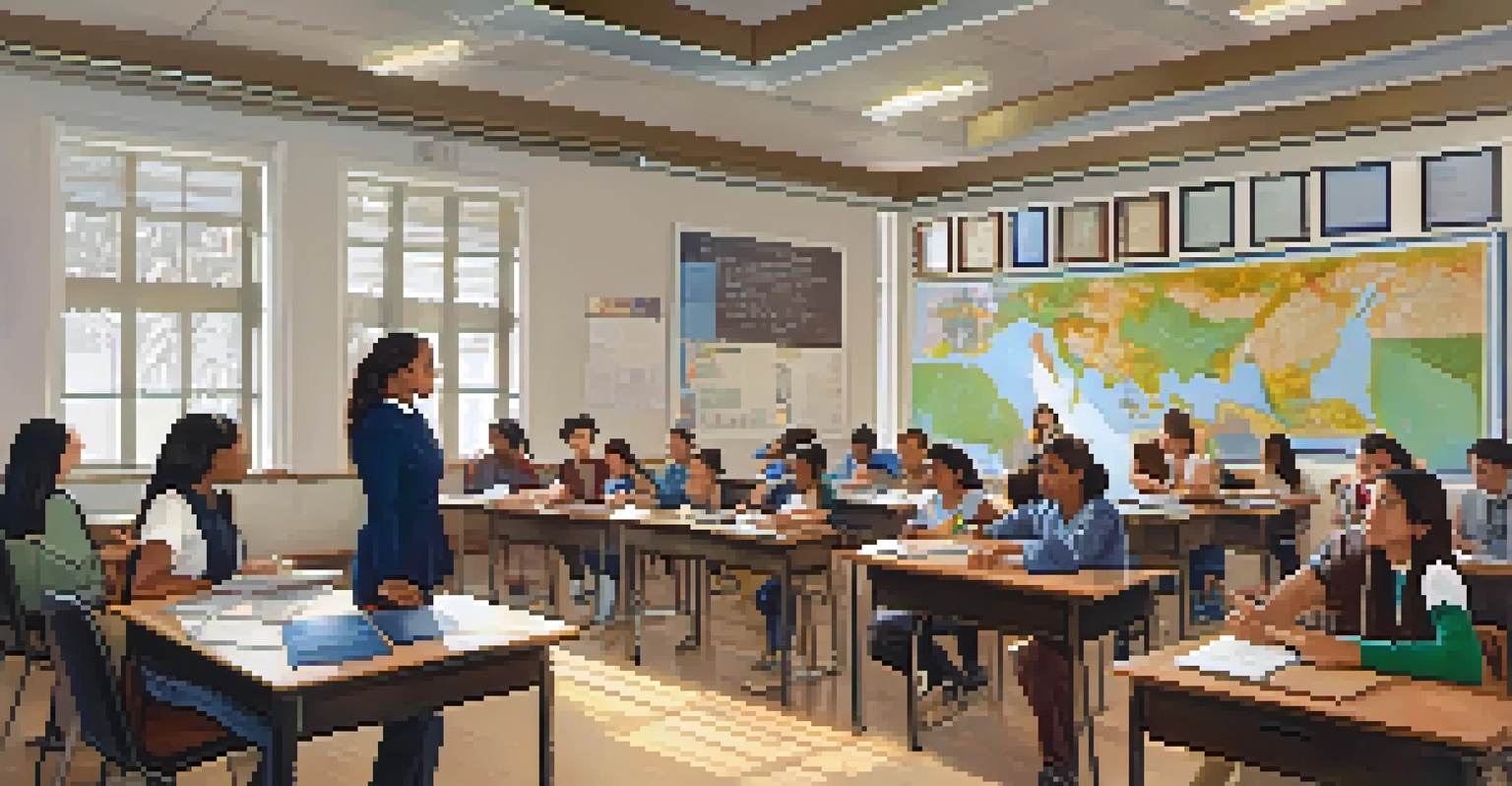Youth Engagement in Minneapolis: Empowering the Next Generation

Understanding Youth Engagement and Its Importance
Youth engagement refers to the active participation of young people in decision-making processes that affect their lives. It’s not just about giving them a voice; it’s about empowering them to take charge of their futures. When youth are engaged, they develop essential skills like leadership, communication, and collaboration that serve them throughout life.
The only way to create a better future is to actively engage the youth of today.
In Minneapolis, fostering a culture of engagement is crucial as it helps bridge the gap between generations. Adults can benefit from the fresh perspectives and innovative ideas that youth bring to the table. This reciprocal relationship enriches the community, making it more vibrant and inclusive.
Moreover, engaged youth are less likely to fall into negative behaviors, as they feel a sense of belonging and purpose. When they are involved in community initiatives or local governance, they become invested in their surroundings, leading to positive change both for themselves and their neighborhoods.
Local Organizations Leading the Charge
Minneapolis boasts a thriving ecosystem of organizations dedicated to youth engagement. Groups like Minneapolis Youth Coordinating Board and the YMCA provide platforms where young people can voice their opinions and contribute to community projects. These organizations not only support youth initiatives but also ensure that their voices are heard in local policymaking.

Through workshops, mentorship programs, and volunteer opportunities, these organizations empower youth to take action in their communities. For instance, local initiatives like the Youth Leadership Council allow young individuals to collaborate on projects that reflect their interests and concerns, fostering a sense of ownership.
Empowering Youth Through Engagement
Active youth participation in decision-making fosters essential life skills and a sense of belonging.
The collaboration between these organizations and the youth creates a ripple effect, inspiring others to get involved. As young people see their peers making a difference, they are more likely to step up and contribute, creating a cycle of engagement that benefits everyone.
Community Initiatives Encouraging Active Participation
In Minneapolis, several community initiatives specifically aim to encourage youth participation. Programs such as the Minneapolis Parks and Recreation Board’s Youth Advisory Committee allow young residents to engage in discussions about park improvements and recreational activities. Such initiatives not only empower youth but also directly impact their environment.
Youth is not only a time of life; it is a state of mind. Engaging youth means empowering them to shape their own futures.
Additionally, events like the annual Youth Summit bring together young people from diverse backgrounds to tackle pressing issues in their communities. By creating a platform for dialogue, these events encourage collaboration and inspire youth to take on leadership roles.
These initiatives highlight the power of collective action, showing youth that they can influence change. As they work together to address challenges, they develop a sense of camaraderie and learn valuable problem-solving skills that will serve them well in the future.
The Role of Schools in Youth Engagement
Schools play a pivotal role in promoting youth engagement by integrating civic education into their curricula. Programs that teach students about local governance, community service, and advocacy can ignite a passion for involvement. When students understand how their actions impact their communities, they are more likely to get involved.
Furthermore, schools that encourage extracurricular activities, such as student government or service clubs, provide valuable opportunities for youth to practice leadership and teamwork. These activities foster a sense of responsibility and help students develop critical skills that are essential in both personal and professional settings.
Local Organizations Drive Change
Minneapolis organizations create platforms for youth to voice their opinions and collaborate on community projects.
By creating an environment that values engagement, schools can nurture a generation of active and informed citizens. When students leave the classroom with a strong foundation in civic participation, they carry those values into their communities, paving the way for a more engaged society.
Youth Voices in Local Governance
In Minneapolis, youth have a growing presence in local governance, influencing decisions that impact their lives. City councils and advisory boards are increasingly including young representatives, ensuring that their perspectives are part of the conversation. This inclusion not only empowers youth but also leads to more inclusive and effective policymaking.
Having young people at the decision-making table allows for fresh ideas and innovative solutions to emerge. Their unique viewpoints can challenge the status quo and prompt policymakers to consider previously overlooked issues. This dynamic can significantly enhance community resilience and adaptability.
Moreover, when youth see themselves reflected in local governance, it fosters a sense of trust in the system. They are more likely to engage in civic activities and advocate for their peers, creating a more connected and engaged community overall.
Barriers to Youth Engagement and Solutions
Despite the positive efforts in Minneapolis, barriers to youth engagement still exist. Factors such as socioeconomic disparities, lack of access to resources, and cultural differences can hinder participation. Recognizing these challenges is essential to developing effective solutions that ensure all young people have a voice.
Community leaders and organizations are working to break down these barriers by providing targeted support and fostering inclusive environments. Programs that focus on accessibility and representation can help ensure that all youth, regardless of background, feel welcome and valued.
Education Enhances Civic Involvement
Schools play a crucial role in promoting youth engagement by integrating civic education and extracurricular activities.
By addressing these barriers, Minneapolis can create a more equitable landscape for youth engagement. When every young person has the opportunity to contribute, the community as a whole benefits from diverse ideas and perspectives.
The Future of Youth Engagement in Minneapolis
Looking ahead, the future of youth engagement in Minneapolis appears promising. With the continued efforts of local organizations, schools, and community leaders, there is a growing recognition of the importance of involving youth in decision-making. This momentum can lead to lasting change and a more vibrant community.
As technology evolves, new platforms for engagement will likely emerge, providing innovative ways for youth to connect and collaborate. Social media and digital tools can help amplify their voices, enabling them to reach wider audiences and influence change on a larger scale.

Ultimately, empowering the next generation is a collective responsibility. By investing in youth engagement today, Minneapolis can cultivate a generation of leaders who are ready to tackle tomorrow's challenges and shape a brighter future for everyone.